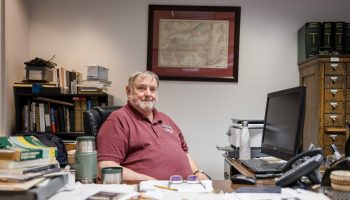
Kaitlyn Finchler
Contributing writer
While the United States may be perceived as a Christian nation, the views and opinions of Americans on religion’s place in politics vary.
Neha Sahgal, vice president of research at Pew Research Center, will deliver her lecture “Religious Nationalism Around the World” at 2 p.m. today in the Hall of Philosophy for the Week Four Interfaith Lecture Series theme, “Who Believes What, and Why That Matters — in association with Pew Research Center.”
“(The lecture) is based on a Pew Research Center survey conducted in 36 countries globally with over 55,000 people,” Sahgal said. “In the survey, we asked people questions about what role religion should play in their collective identity as a country and what role religion should play in the governance of the country.”
In the United States, Sahgal said the survey found Americans tend to support specific aspects of religious nationalism.
“For example, 45% of Americans say that the United States is a Christian nation,” she said. “You might look at that and you might feel alarmed, or somebody who’s a big believer in the First Amendment might feel alarmed and say, ‘Oh, 45% of Americans are religious nationalists.’ ”
However, Sahgal said Americans do not consistently support views and attitudes that would lead them to religious nationalism, which is “really interesting and surprising.”
“What we’re learning from the data is they don’t mean that America should be run like a theocratic country,” Sahgal said. “They mean that the country should be inspired by Christian values and Christian morals, and we find this quite a bit with Americans. They may support some aspects of religious nationalism, but not others.”
Most Americans land in the “fuzzy middle” of what is referred to as “just nationalism,” Sahgal said.
Comparing the United States to other countries around the world, Sahgal said Americans don’t stand out.
Pew Research Center has surveyed countries such as Indonesia, Bangladesh and Kenya. In Kenya’s case, Sahgal said not only are people supportive of religious influence their government, they also feel the Bible should be “the source for all the laws” in the country.
“But, in the case of the United States, some of the principles of the First Amendment, of separation of church and state, do seem to still resonate with people,” she said. “… Some of the principles of the First Amendment and liberal democracy seem really ingrained for Americans. So, even if you see glimpses of people’s views toward religious nationalism being expressed in terms of how they want the country to identify, these positions tend to not be consistent.”
Over the last five to six years, the subject has become part of “a lot of popular discourse” in the United States. Watching the Jan. 6, 2021, insurrection, or a man on TV waving a “Jesus Saves” flag “didn’t go unnoticed,” Sahgal said.
“A lot of people saw that, and other religious leaders immediately came out and said, ‘This is a misappropriation of religious symbolism to justify a violent act,’ ” Sahgal said. “If you’re following some of the latest debates about abortion or about prayer in school, the role that religion should play in American public life is a hotly debated topic.”
The goal at Pew Research Center is to ground the debate about religious nationalism in a set of facts, Sahgal said. Doing so, she said, is similar to using Google Earth.
“You look at your house on your street, and then you zoom out and you can see the city and then you can see the entire Earth, and as you keep zooming out, you get a different perspective,” Sahgal said. “You see your life and your daily life in an entirely different perspective, and it’s important to do that. It’s important to see where you’re situated in the context of the world.”
While the United States doesn’t stand out in terms of opinions on religious nationalism, Sahgal said the levels of religious nationalism and the American public’s desire for religion to have a role in politics is “much higher” than European countries, such as Germany, France or the United Kingdom.
“What I’d like people to come away with is (to) think about their own lives, their own communities, their own families (and) what’s happening in their neighborhood,” Sahgal said. “How do people express their religious views (with) the people around them? How are they on a daily basis? What do they want as far as the religious identity of the United States is concerned?”




